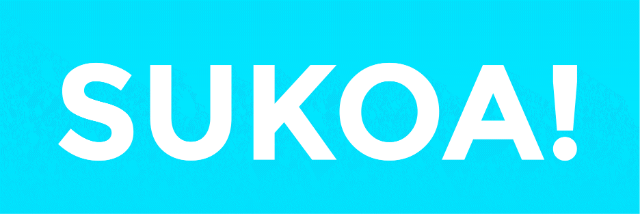
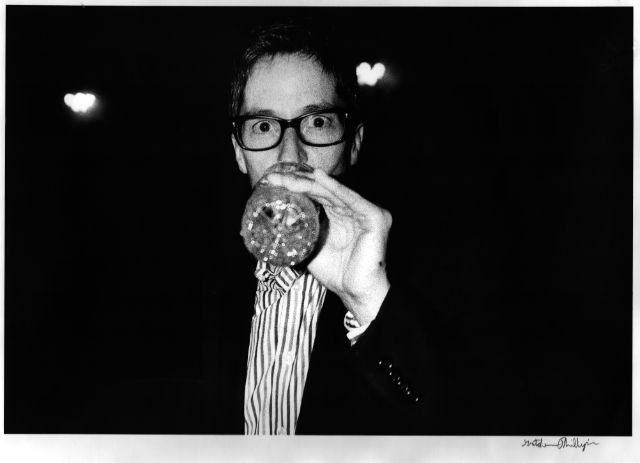
Radikal liebend: Alison Bechdels Kampf um Repräsentation
Die Cartoonistin zeichnet das alltägliche Leben queerer Menschen - und gilt dafür als radikal. In einem Klima zunehmender Homo- und Transphobie sei es aber wichtiger denn je, solidarisch zu sein. Das Cartoonmuseum Basel widmet der amerikanischen Ikone eine Retrospektive: Alison Bechdel. The Essential ist noch bis zum 26. Oktober 2025 zu sehen. von Mirco Kaempf
25.07.11 Alison Bechdel
I apologize if this is an old question, but: back in 1985, how many films you watched at that time would actually pass the Bechdel Test?
Alison Bechdel:
Not very many. In fact, in the comic strip that this test is based on, there is only one movie that passes, and it is Alien, because there are two women in the movie who talk to each other about not a man — but the monster. I did... I love Alien.
_________
Der "Bechdeltest" stammt aus einem Comicstrip von Alison Bechdel aus dem Jahr 1985, indem eine lesbische Frau ihre Regel erklärt, was es braucht, dass sie einen Film schauen geht:
-
Gibt es mindestens zwei weibliche Figuren,
-
die miteinander sprechen –
-
und zwar über etwas anderes als einen Mann?
Der Witz war so klug und treffsicher, dass daraus später ein popkulturelles Barometer für Diversität in der Filmwelt wurde. Doch wer sich die aktuelle Ausstellung „Alison Bechdel – The Essential“ im Cartoonmuseum anschaut, merkt schnell: Alison Bechdel ist weit mehr als nur die Schöpferin dieses Tests.
Der erwähnte Comicstrip stammt aus der Serie Dykes to Watch Out For, die Bechdel rund 25 Jahre lang zeichnete. Darin erzählt sie mit Witz, Feingefühl und politischer Schärfe vom Alltag queerer Frauen – mal banal, mal satirisch, immer zutiefst menschlich. In der Ausstellung sieht man, wie sie zunächst einzelne Panels zeichnete, später ganze Graphic Novels.
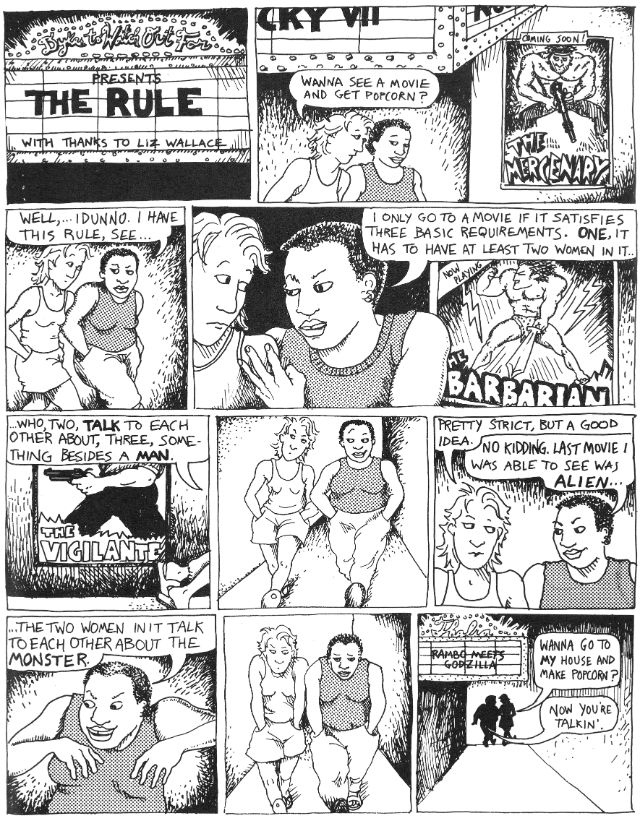
Nowadays the Bechdel Test is cited as a standard for evaluating representation in film. And originally it was just a joke you made, based on Virginia Woolf’s lectures-turned-book — A Room of One’s Own from 1929. Now fast forward to 2025, where U.S. policymakers are taking away the option for a third gender on passports, and there’s this new wave of oppression. Do you think things have really changed in the struggle against patriarchy? Or why do things keep staying the same?
Why do they keep being the same? I don’t know. I feel like there has been tremendous progress. To a certain extent, it’s because of that progress that we’re seeing this really quite psychotic backlash.
We’ve made a more inclusive country — in a wonderful way — for so many people. And the right is using that... as a weapon. They're falsely claiming that this is taking something away from straight white people. The fact that other people are allowed to have lives and subjectivities too is somehow unbearable to them.
It’s not really, of course. It’s just a political strategy that people have used forever to divide others.
There are also right-leaning characters in your recent comics. Why do you think some of these people don’t realize they’re actually worse off under the governance they support?
I don’t know. I’ve been wondering about that for my entire adult life. The answer is that they are being brainwashed. I know that sounds extreme, but I really think it’s true. They’re subjecting themselves to 24/7 right-wing news sources, which are flagrantly lying to them and telling simplistic, appealing stories — blaming whatever little troubles they’re having on gay people or immigrants.
Let's talk about representation. I saw an interview you did with the Young Vic, and you mentioned the photographer Joan E. Biren who documented lesbian women. You said that before she did self-portraits, she had never even seen an image of a lesbian woman.
When you started out, you said you just drew the things you wanted to see — things your friends probably wanted to see, too. Did that take a lot of courage?
No, it didn’t. I mean, I had nothing at stake. I was young. I was very committed to being out, given my own family situation — I had this closeted gay father who ended up killing himself. I could see how destructive it is to keep secrets about yourself.
So no, it didn’t feel brave. It just felt like, this is what I have to do. At the time it felt safe — like, no one was seeing it. It was only a small group of lesbians and maybe a few gay men who were even seeing this stuff. So it wasn’t perceived as a real threat at the time.
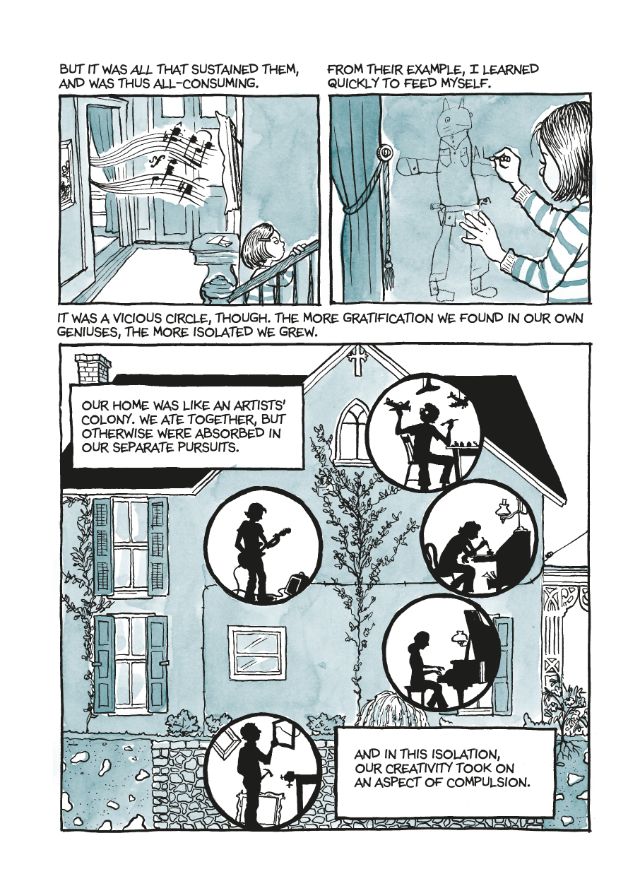
Dazu gehört das bekannte Buch Fun Home, in dem sie ihre eigene Vergangenheit aufarbeitet. Bechdel wuchs in den 1960er-Jahren in einem emotional distanzierten Elternhaus auf, das zugleich ein kleines Bestattungsunternehmen betrieb. Im Jahr 1980, vier Monate nachdem sie sich mit 19 bei ihren Eltern als lesbisch geoutet hatte, nahm sich ihr Vater das Leben. Nach dem Coming-Out erfuhr sie, dass auch er schwul war. Bechdel sagt dazu später nüchtern: „He was gay, and I was gay. He killed himself and I became a lesbian cartoonist.“
Rückblickend verbindet sie mythologische Sagen mit persönlichen Erinnerungen, so vergleicht sie den Akt, wie ihr Vater sie als Kind in die Luft hob mit der Geschichte von Ikarus, der von seinem Vater Flügel geschenkt kriegte, und dann zu Boden stürzte. Auch finden Referenzen zu James Joyce, Albert Camus oder Virginia Woolf, immer wieder statt.
Wer versucht, in der Ausstellung einen Bogen von 1929 über 1985 bis ins Jahr 2025 zu schlagen, wird nachdenklich: Warum gibt es immer noch – oder wieder – so viel Homo- und Transphobie?
Alison Bechdel sieht darin eine politische Strategie der Rechten, besonders in den USA, wo trans Personen derzeit gezielt ihrer Rechte beraubt werden. Fortschritte in Sachen Inklusion führen – so Bechdel – zu einem „psychotischen Backlash“, weil eine offenere Gesellschaft von einigen als Bedrohung empfunden wird. Deshalb, sagt sie, reicht es heute nicht mehr, nur still dazustehen – wir müssen aktiv solidarisch sein.
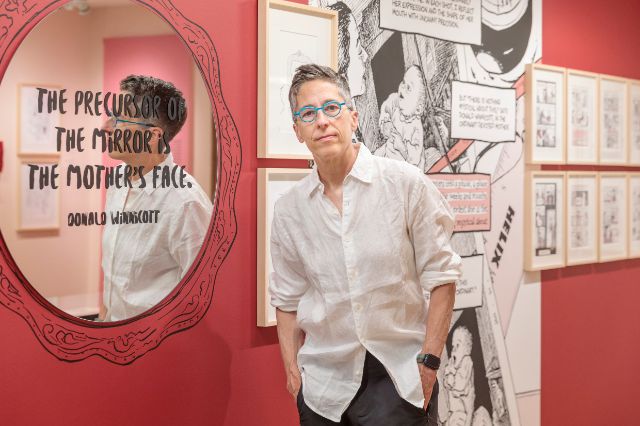
Would you say that in times like these, we have to speak up — or else we’re complicit?
Yeah, I guess that’s true. I feel like we’re all really being tested. It’s been easy to be out as a gay person — even as a trans person — for some time in this country, in the U.S.
But it’s going to get more difficult, and that’s going to require more personal courage. We’ll have to see how everyone does. The important thing is always solidarity — because the more of us who do it, the easier it is for everyone.
That’s the critical part: to get everyone, across all these identities, to join in. Yes, as a man, you should. Yes, support the women.
From what I understand, you didn’t get into certain colleges, (but you got into others) — and you’ve been drawing since you were small. You’ve kind of grown up in this DIY culture, with a sense of community and collective effort, which you said is so important today. Would you consider yourself a punk?
It’s funny — when I was in college, there was this little gang of punk students who were so cool and so beautiful, and I admired them so much. But it never occurred to me that I could be a punk.
I don’t think I have it in me — there’s something missing in my makeup. But I do, yes, share many of those aesthetic principles.
I haven’t found much on this — what kind of music are you into?
You know, I’m sorry to say that I don’t listen to a lot of music. And when I do, it’s almost always classical [...] I have very... bland tastes. I love Bach!
Neben Dykes to Watch Out For und Fun Home gibt die Ausstellung auch Einblick in weitere Werke: Are You My Mother? (2012), The Secret to Superhuman Strength (2021) und das neueste Buch SPENT. In letzterem tauchen Figuren aus ihren frühen Comics wieder auf – nun älter, wie sie selbst, in ihren Sechzigern. Eine von ihnen betreibt nun eine Ziegenfarm.
Über ihre Anfänge sagt Bechdel, sie wollte einfach Comics zeichnen, in denen sich ihre eigene Community wiederfinden konnte – ein Stück Repräsentation in einer Welt, die oft repressiv und sexistisch war (und ist).
Am Ende findet sie einfache, aber kraftvolle Worte. Eine Haltung, die politisch überlebenswichtig bleibt: "just keep drawing".
So — your retrospective here in Basel — the word “retrospective” always has a finite ring to it. It’s your body of work, everything displayed...
Yes, it does. I hope not. It’s unnerving to see that word “retrospective” and then see all this work organized in these lovely little rooms.
It does make me worry — is this the end? Can we now just put the lid on it and I’m done?
But I certainly hope not. I want to keep drawing. That’s what I always say to people who ask me for advice: just keep drawing.

Radikal liebend: Alison Bechdels Kampf um Repräsentation
Die Cartoonistin zeichnet das alltägliche Leben queerer Menschen - und gilt dafür als radikal. In einem Klima zunehmender Homo- und Transphobie sei es aber wichtiger denn je, solidarisch zu sein. Das Cartoonmuseum Basel widmet der amerikanischen Ikone eine Retrospektive: Alison Bechdel. The Essential ist noch bis zum 26. Oktober 2025 zu sehen. von Mirco Kaempf
25.07.11 Alison Bechdel
I apologize if this is an old question, but: back in 1985, how many films you watched at that time would actually pass the Bechdel Test?
Alison Bechdel:
Not very many. In fact, in the comic strip that this test is based on, there is only one movie that passes, and it is Alien, because there are two women in the movie who talk to each other about not a man — but the monster. I did... I love Alien.
_________
Der "Bechdeltest" stammt aus einem Comicstrip von Alison Bechdel aus dem Jahr 1985, indem eine lesbische Frau ihre Regel erklärt, was es braucht, dass sie einen Film schauen geht:
-
Gibt es mindestens zwei weibliche Figuren,
-
die miteinander sprechen –
-
und zwar über etwas anderes als einen Mann?
Der Witz war so klug und treffsicher, dass daraus später ein popkulturelles Barometer für Diversität in der Filmwelt wurde. Doch wer sich die aktuelle Ausstellung „Alison Bechdel – The Essential“ im Cartoonmuseum anschaut, merkt schnell: Alison Bechdel ist weit mehr als nur die Schöpferin dieses Tests.
Der erwähnte Comicstrip stammt aus der Serie Dykes to Watch Out For, die Bechdel rund 25 Jahre lang zeichnete. Darin erzählt sie mit Witz, Feingefühl und politischer Schärfe vom Alltag queerer Frauen – mal banal, mal satirisch, immer zutiefst menschlich. In der Ausstellung sieht man, wie sie zunächst einzelne Panels zeichnete, später ganze Graphic Novels.

Nowadays the Bechdel Test is cited as a standard for evaluating representation in film. And originally it was just a joke you made, based on Virginia Woolf’s lectures-turned-book — A Room of One’s Own from 1929. Now fast forward to 2025, where U.S. policymakers are taking away the option for a third gender on passports, and there’s this new wave of oppression. Do you think things have really changed in the struggle against patriarchy? Or why do things keep staying the same?
Why do they keep being the same? I don’t know. I feel like there has been tremendous progress. To a certain extent, it’s because of that progress that we’re seeing this really quite psychotic backlash.
We’ve made a more inclusive country — in a wonderful way — for so many people. And the right is using that... as a weapon. They're falsely claiming that this is taking something away from straight white people. The fact that other people are allowed to have lives and subjectivities too is somehow unbearable to them.
It’s not really, of course. It’s just a political strategy that people have used forever to divide others.
There are also right-leaning characters in your recent comics. Why do you think some of these people don’t realize they’re actually worse off under the governance they support?
I don’t know. I’ve been wondering about that for my entire adult life. The answer is that they are being brainwashed. I know that sounds extreme, but I really think it’s true. They’re subjecting themselves to 24/7 right-wing news sources, which are flagrantly lying to them and telling simplistic, appealing stories — blaming whatever little troubles they’re having on gay people or immigrants.
Let's talk about representation. I saw an interview you did with the Young Vic, and you mentioned the photographer Joan E. Biren who documented lesbian women. You said that before she did self-portraits, she had never even seen an image of a lesbian woman.
When you started out, you said you just drew the things you wanted to see — things your friends probably wanted to see, too. Did that take a lot of courage?
No, it didn’t. I mean, I had nothing at stake. I was young. I was very committed to being out, given my own family situation — I had this closeted gay father who ended up killing himself. I could see how destructive it is to keep secrets about yourself.
So no, it didn’t feel brave. It just felt like, this is what I have to do. At the time it felt safe — like, no one was seeing it. It was only a small group of lesbians and maybe a few gay men who were even seeing this stuff. So it wasn’t perceived as a real threat at the time.

Dazu gehört das bekannte Buch Fun Home, in dem sie ihre eigene Vergangenheit aufarbeitet. Bechdel wuchs in den 1960er-Jahren in einem emotional distanzierten Elternhaus auf, das zugleich ein kleines Bestattungsunternehmen betrieb. Im Jahr 1980, vier Monate nachdem sie sich mit 19 bei ihren Eltern als lesbisch geoutet hatte, nahm sich ihr Vater das Leben. Nach dem Coming-Out erfuhr sie, dass auch er schwul war. Bechdel sagt dazu später nüchtern: „He was gay, and I was gay. He killed himself and I became a lesbian cartoonist.“
Rückblickend verbindet sie mythologische Sagen mit persönlichen Erinnerungen, so vergleicht sie den Akt, wie ihr Vater sie als Kind in die Luft hob mit der Geschichte von Ikarus, der von seinem Vater Flügel geschenkt kriegte, und dann zu Boden stürzte. Auch finden Referenzen zu James Joyce, Albert Camus oder Virginia Woolf, immer wieder statt.
Wer versucht, in der Ausstellung einen Bogen von 1929 über 1985 bis ins Jahr 2025 zu schlagen, wird nachdenklich: Warum gibt es immer noch – oder wieder – so viel Homo- und Transphobie?
Alison Bechdel sieht darin eine politische Strategie der Rechten, besonders in den USA, wo trans Personen derzeit gezielt ihrer Rechte beraubt werden. Fortschritte in Sachen Inklusion führen – so Bechdel – zu einem „psychotischen Backlash“, weil eine offenere Gesellschaft von einigen als Bedrohung empfunden wird. Deshalb, sagt sie, reicht es heute nicht mehr, nur still dazustehen – wir müssen aktiv solidarisch sein.

Would you say that in times like these, we have to speak up — or else we’re complicit?
Yeah, I guess that’s true. I feel like we’re all really being tested. It’s been easy to be out as a gay person — even as a trans person — for some time in this country, in the U.S.
But it’s going to get more difficult, and that’s going to require more personal courage. We’ll have to see how everyone does. The important thing is always solidarity — because the more of us who do it, the easier it is for everyone.
That’s the critical part: to get everyone, across all these identities, to join in. Yes, as a man, you should. Yes, support the women.
From what I understand, you didn’t get into certain colleges, (but you got into others) — and you’ve been drawing since you were small. You’ve kind of grown up in this DIY culture, with a sense of community and collective effort, which you said is so important today. Would you consider yourself a punk?
It’s funny — when I was in college, there was this little gang of punk students who were so cool and so beautiful, and I admired them so much. But it never occurred to me that I could be a punk.
I don’t think I have it in me — there’s something missing in my makeup. But I do, yes, share many of those aesthetic principles.
I haven’t found much on this — what kind of music are you into?
You know, I’m sorry to say that I don’t listen to a lot of music. And when I do, it’s almost always classical [...] I have very... bland tastes. I love Bach!
Neben Dykes to Watch Out For und Fun Home gibt die Ausstellung auch Einblick in weitere Werke: Are You My Mother? (2012), The Secret to Superhuman Strength (2021) und das neueste Buch SPENT. In letzterem tauchen Figuren aus ihren frühen Comics wieder auf – nun älter, wie sie selbst, in ihren Sechzigern. Eine von ihnen betreibt nun eine Ziegenfarm.
Über ihre Anfänge sagt Bechdel, sie wollte einfach Comics zeichnen, in denen sich ihre eigene Community wiederfinden konnte – ein Stück Repräsentation in einer Welt, die oft repressiv und sexistisch war (und ist).
Am Ende findet sie einfache, aber kraftvolle Worte. Eine Haltung, die politisch überlebenswichtig bleibt: "just keep drawing".
So — your retrospective here in Basel — the word “retrospective” always has a finite ring to it. It’s your body of work, everything displayed...
Yes, it does. I hope not. It’s unnerving to see that word “retrospective” and then see all this work organized in these lovely little rooms.
It does make me worry — is this the end? Can we now just put the lid on it and I’m done?
But I certainly hope not. I want to keep drawing. That’s what I always say to people who ask me for advice: just keep drawing.

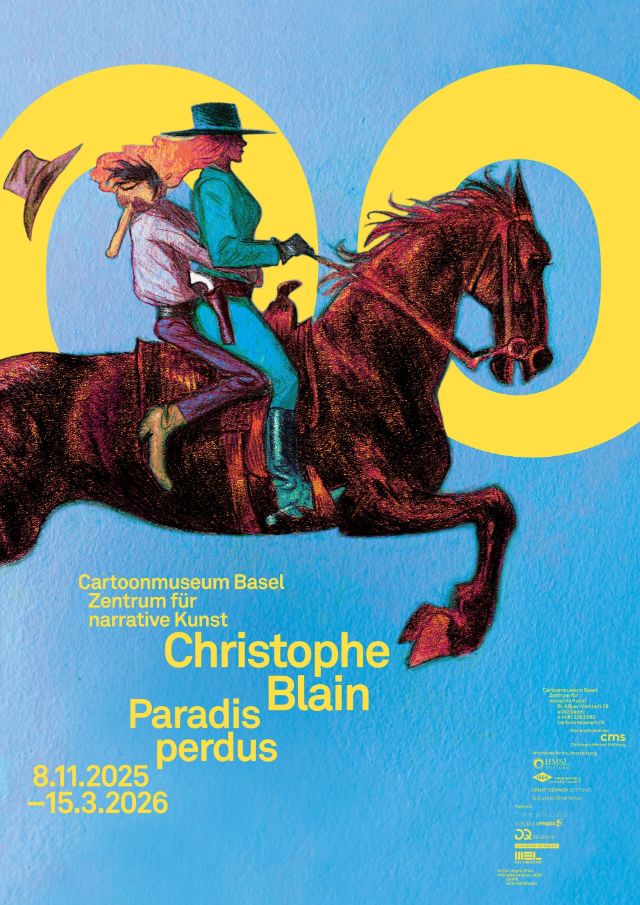
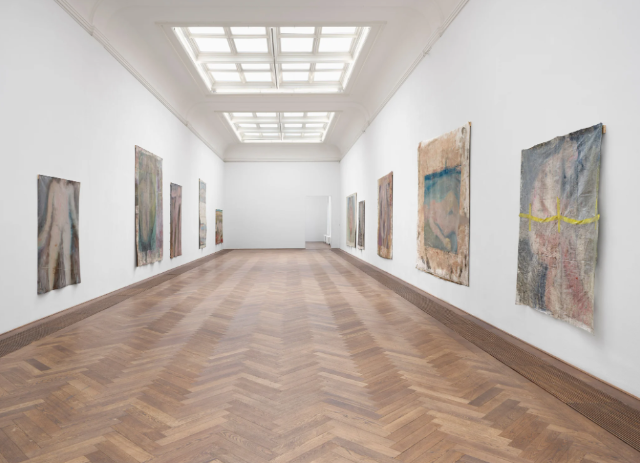
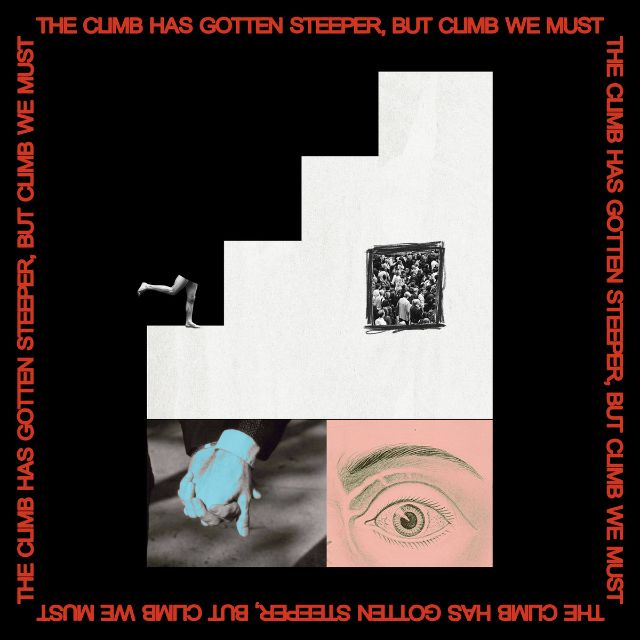
.png/jcr:content/magnolia-medium.png)
